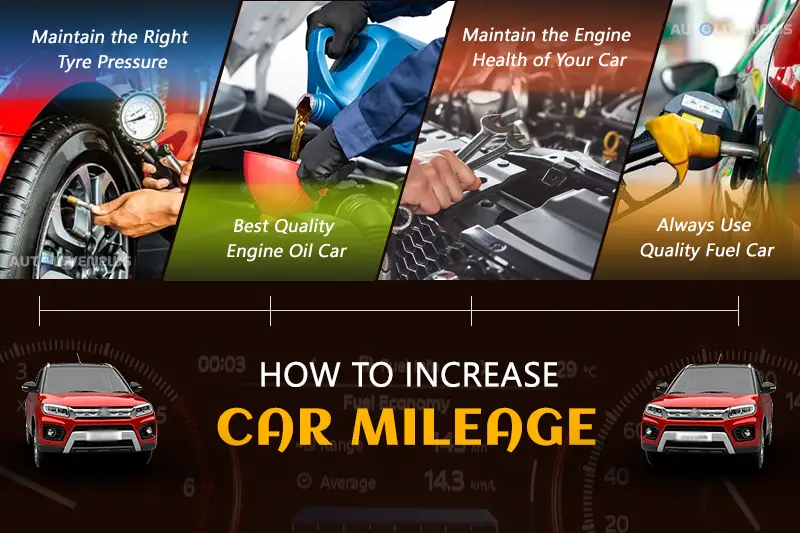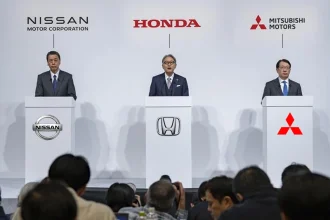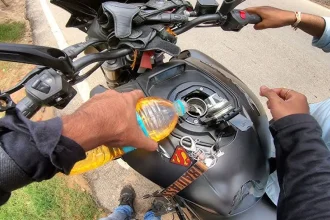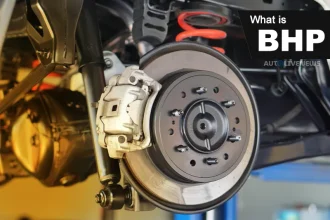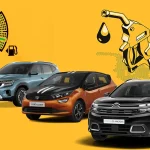What use is a car if it runs out of fuel before you’ve even left the driveway? This is why a good mileage is so important.
Be it a new car or an old one, it ought to give you appreciable mileage. If it doesn’t, you end up spending a fortune on fuel, downgrading your driving experience, and worse, degrading the environment.
But the good news is, with few small changes and practical methods, you can make the most out of every liter. Here’s our detailed guide on how to increase car mileage.
What Is Car Mileage?
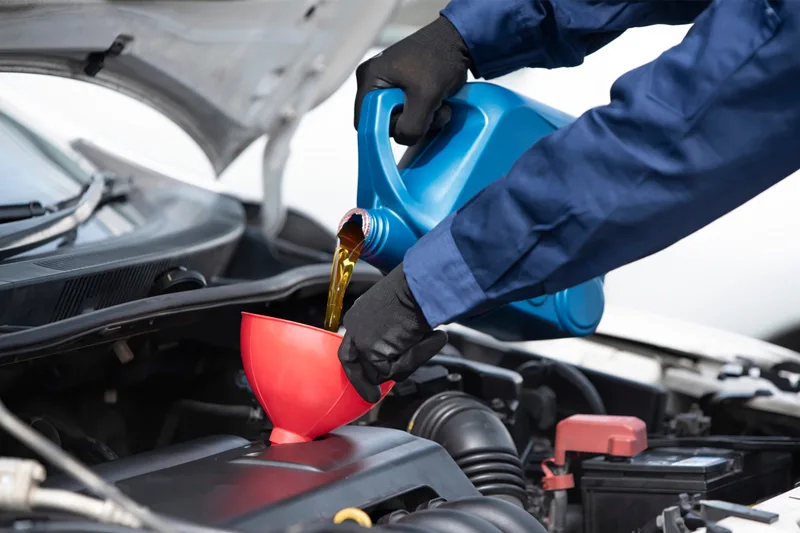
“Mileage” refers to the distance your car can travel on a particular quantity of fuel. That is, how many kilometers your car can go per liter of fuel.
A car’s mileage indicates how well it utilizes fuel, and understanding this can help you gauge its performance. So, when evaluating a car, its engine’s efficiency is reflected in the mileage it offers.
The average car mileage may vary based on the route and driving conditions. For example, highway driving often yields better mileage for a car, while off-road driving may deliver different fuel-efficient results.
What Is Good Mileage On A Car?
There is no one right way to answer that question because many variables affect a car’s mileage. For instance, a used car is most likely a great purchase if it is in good functioning order and has about 80000 kilometers on it. For that matter, a less expensive car with 16100 km or more can still last you many years, provided you take good care of it. When assessing a vehicle’s longevity and worth, it’s critical to take the average car mileage into account.
Here are some of the luxury cars in India with the maximum mileage:
| Model | Mileage (kmpl) | Ex-Showroom Price |
|---|---|---|
| BMW XM | 61.9 | ₹2.98 Crore |
| Mercedes Benz AMG C 63 | 50 | ₹1.95 Crore |
| BMW M5 | 49.75 | ₹1.99 Crore |
Meanwhile, passenger SUVs in India like Tata Punch, Maruti Suzuki Grand Vitara, and Kia Sonnet offer impressive mileage.
How To Calculate Car Mileage Correctly?
Follow these steps to determine how to calculate car mileage:
Step 1: Note the current odometer reading after filling up the petrol tank.
Step 2: Refill the tank after a long drive before it runs almost empty.
Step 3: To fill the petrol tank, note how many liters are filled.
Step 4: After refilling, take note of the revised odometer reading.
Step 5: Apply the following formula: Total Distance Covered ÷ Fuel Quantity Filled
Possible Reasons For Low Mileage
The age of the car and its usage are inversely proportional to the mileage it gives. A lot of it depends on the driver, too. Rash driving, sudden braking, rushed acceleration, and randomly changing lanes wobble up a lot more fuel.
However, some causative factors, such as driving through cold weather, terranes, and coarse or damaged roads, are not in the driver’s control. Each of these lead to more fuel being used up, gradually depleting the car’s mileage.
12 Ways To Increase Car Mileage
For all of those wondering how to increase car mileage, we’ve got some simple tips and tricks for you. Let’s dive in:
1. Fuel-Efficient Driving Practices
Do not underestimate the power of good driving skills in improving mileage. This involves maintaining an optimal speed of 55-95 kilometers per hour. Driving below 40 km/h strains the engine and speeds above 80 km/h increase wind drag and tire friction. It is also very important to avoid hard braking. This conserves kinetic energy, in turn cutting down fuel wastage and improving mileage. As a rule of thumb, remember that when you drive in a calm, attentive manner, you keep your mileage intact.
2. Maintain Tire Pressure
Maintaining optimal tire pressure reduces rolling resistance. This improves fuel efficiency as the vehicle now requires less energy to move the vehicle. Under-inflated tires increase friction between the road and the tire. This consumes more fuel and accelerates tire wear. Over-inflated tires may save fuel but compromise grip, stability, and aquaplaning resistance, which is dangerous.
3. Use Quality Engine Oil And Lubricants
Engine oil grade, viscosity, and quality directly affect how well your engine runs. This also affects the mileage it delivers. Always ensure your car is topped up with high-quality oil. Follow the recommendation for your particular vehicle. Substandard or incorrect oil can lead to poor engine performance. This will reduce its mileage. Using superior-quality lubricants, on the other hand, can improve mileage. It also extends your engine’s life, ensuring smooth operation over time.
4. Check Wheel Alignment
Proper wheel alignment is one the most important answers to how to improve car mileage. Tires wear out irregularly due to misaligned wheels. The increased rolling resistance is because the engine has to work a bit harder to keep the wheels rolling. This affects not just the fuel consumption but also contributes to the shortening of the lifespan of the tires. This brings extra maintenance costs. Regular checks on the wheel alignment of the vehicle and ensuring that the issues are looked at by a professional alignment service can help ensure smooth tire rotation.
5. Shift Gears At The Right Time
Appropriate gear change is crucial to get good mileage. This is for both driving a manual or automatic transmission vehicle. When driving an automatic vehicle, to reduce engine work and fuel consumption, you should upshift to the highest gear as soon as possible after the applicable speed zone is reached.
In fully automatic, non-aggressive acceleration, leading to engine over-revving, and by ensuring smooth gear shifts instead. Through this practice, power allocation is high. If you keep an eye on gear switches, you can save fuel. You can also prevent engine wearout and continue to improve the performance of the vehicle in the long term.
6. Leave The Air-Con Turned Off
Overuse of Air-Con can affect a car’s fuel economy, as it creates an extra load on the engine. So, how to increase car mileage? Use natural ventilation or open windows for cooling when the weather is mild. Times of high heat/humidity or high-speed driving can be excluded for active AC if maximizing mileage can be maintained by not running the engine fan with the AC on. Not only does air-con use (or lack of it) save fuel, but it also assists in decreasing unnecessary stress on your vehicle’s engine. This results in a more fuel-efficient, economical, and environmentally friendly way to drive.
7. Pick The Optimal Torque Range
A common myth about fuel economy is that most efficiency occurs at peak torque. While this can be true at cruising speeds, it’s more effective to maintain a constant speed. This depends on whether you are driving in the city or on the highway. By avoiding frequent acceleration and deceleration, you reduce the strain on your engine. This reduces unnecessary power usage and improves fuel economy.
8. Reduce Extra Weight From The Car
Lighter cars are generally more fuel-efficient because they need less energy to move. Your engine will work harder and use less fuel if it has to transport more weight. Heavier vehicles experience much more inertia and rolling resistance. Both of these negatively impact mileage. According to the US EPA, every 45 kg added to your vehicle can reduce fuel efficiency by 2%. So regularly remove unnecessary items from your car. Look especially from the boot to ensure it’s not weighed down.
9. Keep It Shut When Idle
Idling wastes fuel and significantly impacts mileage. This is because the engine continues to burn fuel without actually moving the vehicle. So if you are thinking about how to increase car mileage, it’s best to turn off the ignition during long stops. These include waiting at traffic signals or other. Start your vehicle only before you’re ready to drive. In the long run, reducing idling can lead to noticeable improvements in your car’s mileage.
10. Route Planning To Avoid Traffic
If you often wonder about how to increase car mileage, planning your journey could be of great help. Stops and traffic jams use up more fuel; hence, it is useful to determine a mapping with as few signals and traffic jams as possible. Avoiding traffic jams and rush hours by not driving on city roads and reducing the frequency of braking and acceleration leads to greater fuel economy. Overall, planning ahead saves time and also reduces fuel consumption and improves overall mileage.
11. Keep The Tank Half Full At All Times
Nobody likes to see the fuel analog pointing at zero when you’re all set to head out. Apart from avoiding this disappointment, compulsively keeping your tank half-full benefits your car’s mileage too. This is because running your car at low fuel can allow debris from the bottom of the fuel tank to infiltrate the engine. Over time, this harms the engine’s performance. Keeping your fuel tank at least half full at all times prevents contaminants from making their way to the engine.
12. Regular Car And Engine Inspections
Regular inspections are important for maintaining your vehicle’s efficiency. Dirty air filters, worn brake pads, or sticky brakes can reduce mileage over time. Schedule regular services. Request checks for unusual brake wear and ensure filters are clean. Slight drops in mileage are natural as a car ages. Drastic changes may show underlying issues. Addressing these promptly through professional inspections and maintenance helps keep your car running efficiently. Thus, it will extend its lifespan. Thus, it helps to increase mileage.
Tools And Technology For Better Mileage
Using tools and technologies could be the answer to how to increase car mileage. Let’s see how:
Mileage apps: These are one of the most important assets in monitoring fuel economy, helping you track your fuel consumption. These apps enable you to log distance, fuel consumed, and cost to refill, which enables you to understand the pattern in the way you drive, the state of the road, and the way you choose fuel. They also offer the ability to add notes on different fuels or additives, providing valuable insights to improve efficiency.
Eco-driving mode: This exciting technological aspect is usually implemented in current vehicles. In these modes, climate control targets, throttle response, and engine behavior are optimized to optimize fuel efficiency at the expense of power. Through configuring these parameters, eco-driving modes can be used to provide more fuel-efficient performance without compromising too much. Moreover, onboard fuel efficiency analytics is often included with cars, which monitors real-time fuel economy and provides feedback on acceleration, braking, and maneuvering behavior. They also gamify the experience, encouraging drivers to engage in fuel-efficient behaviors.
How much fuel and money can you save by following these tips?
The present condition of your vehicle and your driving style will determine exactly how much money and fuel you can save. Although, it is worth mentioning that keeping your air conditioner turned off can help you save at least 4% on fuel. Now, since you know how to increase car mileage, you can drive a more fuel-efficient and greener car and save money on fuel. Remember, even small modifications in driving behavior and routine service can provide major benefits. Also, please do not underestimate the role of car insurance, which offers essential financial security in case of unforeseen circumstances. Using these few steps, you can together improve vehicle performance as well as vehicle safety and reduce costs over the long term.
Frequently Asked Questions
How to improve car mileage?
Checking on how to increase car mileage? Improving your car’s mileage starts with maintaining the engine’s health through regular checkups. Lower the internal load by reducing unnecessary weight and ensure you use the right engine oil. Drive smoothly, avoid open windows at high speeds, maintain optimal tire pressure, and verify wheel alignment regularly.
Which petrol gives extra mileage?
There are several reasons for reasons for low mileage in petrol cars. However, Power petrol, also known as premium petrol, can improve fuel economy and mileage compared to regular petrol. Power petrol contains a higher octane rating, allowing for better combustion and more efficient engine performance.
What is the best speed for mileage?
The most fuel-efficient speed for a vehicle typically ranges between 35 and 60 miles per hour, as it minimizes engine strain and reduces fuel consumption, varying based on the vehicle type.
How to Increase Mileage of Gas (CNG) Car?
To enhance the mileage of the best CNG cars in India, ensure proper tire pressure, drive gently without sudden accelerations or braking, reduce unnecessary weight, and follow regular maintenance schedules like engine checks and filter replacements for better fuel efficiency.
How to get good mileage in a car that runs on diesel?
To boost diesel car mileage, perform regular maintenance such as oil changes and air filter replacements. Keep tire pressure optimal, avoid unnecessary weight, and drive at steady speeds for improved fuel efficiency.
How to increase mileage of petrol car?
Optimal tire pressure, disciplined driving, and regular maintenance are the key to sustaining the mileage of your petrol car. If you are seeking to buy one, go for the highest mileage petrol car in India, for fuel-conscious and pocket-friendly performance.
While the hacks to improve mileage in diesel and petrol cars have similarities, it is important to know the distinctiveness of each. Click here to learn more about diesel and petrol difference and delve into a detailed comparative study of the two. If you’re interested in learning ways to increase mileage of bike, click here.
Does this piece answer all your questions on improving the mileage of your car? Let us know in the comments.



